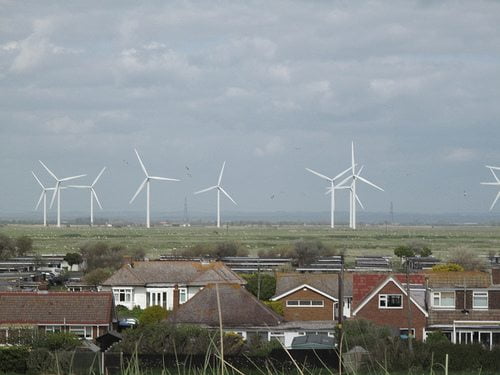

Energy
Government to review impact of energy infrastructure on house prices
The Department for Environment, Food and Rural Affairs (Defra) has commissioned a study to find out the effect of energy projects – including shale gas and wind farms – on house prices.
Environment secretary Owen Paterson has asked economic consultancy firm Frontier Economics – which has among its directors Andrew Turnbull, trustee of the climate change denying thinktank the Global Warming Policy Foundation– to calculate the possible price impacts or loss of value on properties for the development of each technology by 2020.
The review will look at onshore wind, biomass, overhead power lines, shale gas, anaerobic digestion plants and nuclear power stations.
Due in September, the study “aims to determine whether [energy projects] have a significant impact on the prices of houses nearby and, if so, compare how that impact differs between different types”.
A Defra representative said, “It is our role to rural-proof policy. We need to ensure that energy is generated in a way that is sustainable. Sustainability includes the economic as well as social and environmental impacts.”
On Tuesday, the Daily Telegraph reported on an internal war between Paterson, a wind farm opponent, and energy secretary Ed Davey, over the publication of key findings about the negative impact of wind turbines in rural areas.
Davey has denied he is trying to prevent the publication of such findings. He wrote a letter to the newspaper saying, “My department is not blocking a Defra report on the impact of wind farms. The government is committed to moving to a secure, affordable, low-carbon energy system, without excessively relying on any single technology.
“So this cross-government study will look at maximising the benefits and minimising the negative impacts of all technologies, including shale gas and nuclear.”
However, environmental policy magazine the ENDS Report notes that it is unlikely the study could come to a reliable conclusion on the impact of shale gas on properties, because the development of fracking sites is at a too early stage. Meanwhile, it adds that “sufficient property sales” must have occurred near the energy infrastructure in order to achieve a significant statistical value.
Further reading:
Ministers are fighting over wind farms, says the Telegraph
Government plans could allow communities to reject wind farms
Government gives communities a voice in developing ‘truly sustainable’ onshore wind


 Environment12 months ago
Environment12 months agoAre Polymer Banknotes: an Eco-Friendly Trend or a Groundswell?

 Features11 months ago
Features11 months agoEco-Friendly Cryptocurrencies: Sustainable Investment Choices

 Features12 months ago
Features12 months agoEco-Friendly Crypto Traders Must Find the Right Exchange

 Energy11 months ago
Energy11 months agoThe Growing Role of Solar Panels in Ireland’s Energy Future


























